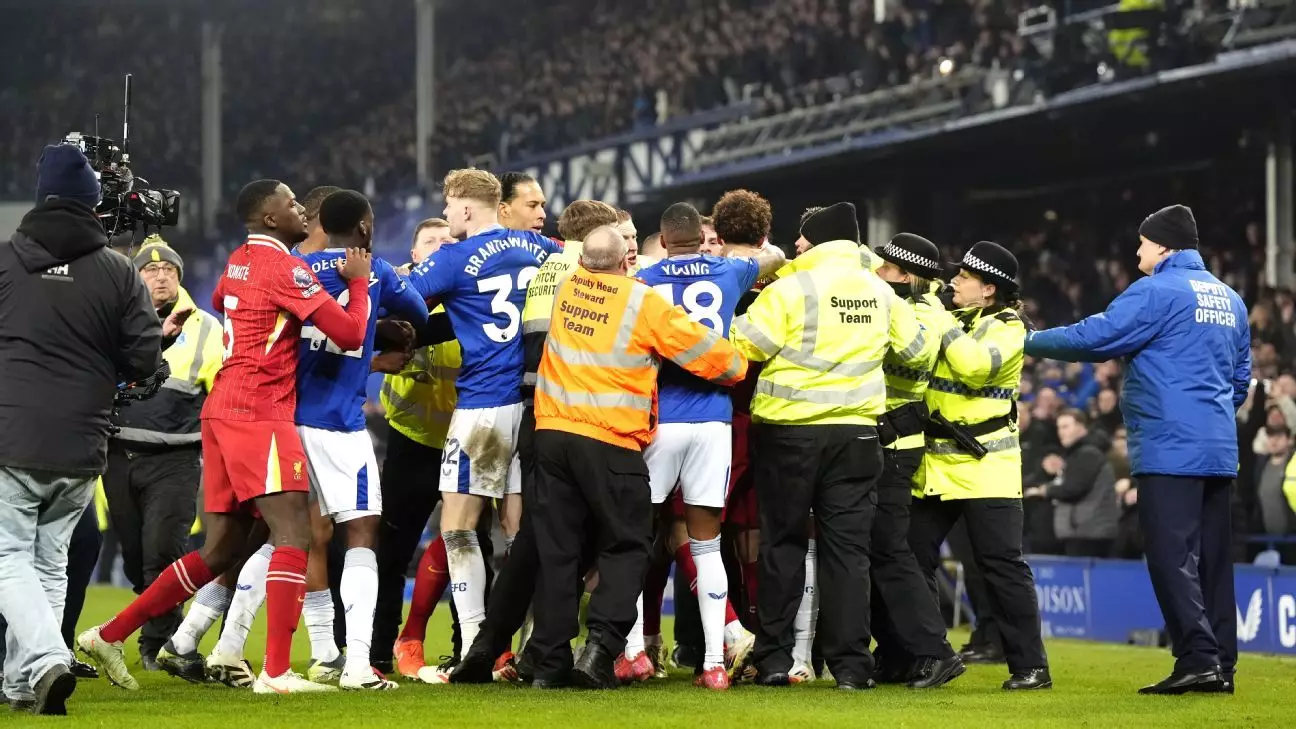The Merseyside derby, a fixture steeped in history and passionate rivalry, reached a boiling point during the latest encounter at Goodison Park. The match, ending in a dramatic 2-2 draw, saw emotions run high as players, coaches, and fans were left reeling from a series of contentious moments. This clash not only impacted the teams’ standings but also underscored the intensity of local rivalries and the high stakes they often entail.
The 98th-minute equalizer by James Tarkowski served as the catalyst for a post-match brawl, igniting a flashpoint after the whistle blew. This late strike was celebrated exuberantly by Everton’s Doucouré, whose actions, perceived by Liverpool’s Curtis Jones as provocative, prompted an immediate confrontation. What could have been a celebratory moment instead morphed into chaos, showcasing how quickly tensions can escalate in high-pressure situations. The brawl that ensued not only involved the players but also drew in coaching staff and security personnel, demonstrating the fractious nature of this venerable encounter.
Referee Michael Oliver faced heavy scrutiny following the match. With both Doucouré and Jones already cautioned, the decision to issue a second yellow card to each after the brawl was contentious. Liverpool’s captain, Virgil van Dijk, expressed discontent, indicating that Oliver’s officiating contributed to the match spiraling out of control. His comments reflect a broader sentiment that match officials wield significant influence over player behavior and game dynamics. The tension in the air may have been exacerbated by the stakes involved—Liverpool on the verge of extending their lead at the top of the Premier League and Everton desperately fighting against relegation.
Adding another layer to the tension, Liverpool’s head coach, Arne Slot, and assistant coach, Sipke Hulshoff, also received red cards after their intervention in the melee. This left Slot unavailable for post-match commentary, a missed opportunity to address the media and clarify the team’s perspective. His ejection showcased the emotional commitment coaches invest in pivotal matches and highlighted the thin line between passion for the game and professionalism. The inability to articulate post-match sentiments reflects the broader implications of such incidents, in which key figures are removed from the conversation due to heightened emotions.
This derby was further charged by the historical context—being the last meeting between the two teams at Everton’s old ground before the club transitions to a new stadium. Such circumstances only heightened the significance of the match, reframing it not just as a battle for points but as a historical chapter in the fierce rivalry that defines Merseyside. The stakes were monumental, and as echoed by returning Everton manager David Moyes, the game was “right up there” regarding the memorable chaos often associated with this fixture.
Despite the chaotic finish, both teams exhibited determination and quality throughout the match. For Liverpool, the draw represented a missed opportunity to extend their lead, yet they remain a formidable force in the league. For Everton, the hard-fought point is invaluable in their relegation battle, offering a respite in what has been a tumultuous season. As both teams continue to navigate their respective challenges, this derby serves as a reminder of the unpredictable and often exhilarating nature of football, underscoring the idea that every match holds the potential for drama and unexpected outcomes.
As the dust settles, players and coaches alike must process the emotional rollercoaster that was the Merseyside derby, indicating that rivalries, particularly in football, are about much more than just points; they encompass pride, history, and the unyielding desire to triumph over local foes.


Leave a Reply